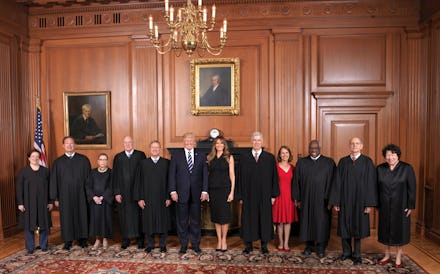Supreme Court rules Bush admin. officials can't be sued, dissent warns of threat to civil liberty

The Supreme Court ruled 4-2 Monday that Bush administration officials could not be sued over the treatment of primarily Muslim detainees following 9/11.
Justices Sonya Sotomayor, Elena Kagan and Neil Gorsuch did not participate in the case; Kagan and Sotomayor had involvement with the lawsuit's earlier stages before joining the Court, and Gorsuch was not confirmed until after the case was argued. The ruling was divided along traditional party lines.
Justice Anthony Kennedy, who wrote for the majority, said of the issue of detainee abuse:
There is therefore a balance to be struck, in situations like this one, between deterring constitutional violations and freeing high officials to make the lawful decisions necessary to protect the Nation in times of great peril.
According to Kennedy, Congress should make decisions about when public officials can be sued, not the courts. Unless Congress intervenes, detainees will face an uphill battle when bringing suits against public officials for actions they performed while in office.
Dissent says liberty is threatened when citizens can't hold officials accountable
Justice Stephen Breyer explained in the dissent, along with Justice Ruth Bader Ginsburg, that redress for citizens against public officials in times of war or national security emergencies is a necessity.
"History tells us of far too many instances where the Executive or Legislative Branch took actions during time of war that, on later examination, turned out unnecessarily and unreasonably to have deprived American citizens of basic constitutional rights," Breyer warned.
The case carries additional weight due to the racial nature of the detainments. The Hill reported that every would-be plaintiff against the officials in this case was of Arab or South Asian descent.
According to the New York Times, the detainees in this case described beatings, humiliating searches and other abuses they experienced during their detainment. The case had been in litigation since 2002, when it began as a class-action suit.